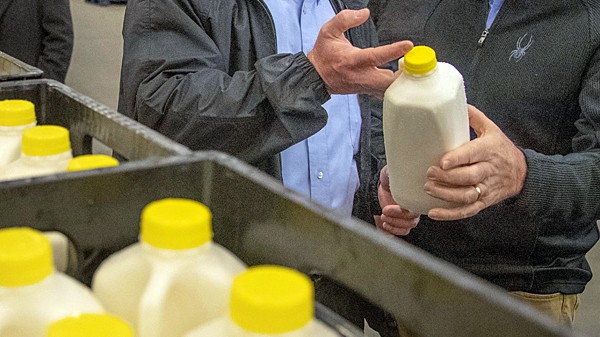
Time is running out for our family-sized dairy farms! However, the Federal Milk Marketing Improvement Act is now resurfacing once again, and the authors, Arden Tewksbury and Gerald Carlin, have made some favorable changes in the bill.
For the first time, dairy cooperatives are going to have to pay the same basic formula price to their members as the proprietary handlers have to pay.
No longer will a so-called make allowance be deducted from the basic formula price which has always lowered the price to all dairy farmers.
All buying handlers will take possession of the milk once the milk is pumped into a tanker.
The dairy farmers’ price will be determined by the national average cost of production as determined by the Economic Research Service, a division of the USDA. This basic formula price will be the Class II price, and all milk used for manufacturing purposes will be Class II. The Class I price will be determined in each Federal or State order by using the Class II price plus existing Class I differentials.
Every dairy farmer will have a milk base.
A) This base will be the average of the last three years of production
B) If a dairy farmer produces over his base and the milk is not needed, then the producer will be charged a small fee. But if the milk over his base is needed, then the dairy farmer will not be charged a penalty for over-producing over his base. But he will receive the going price. Any funds collected from over base milk will be credited to the commodity credit corporation (CCC). The amount collected by the CCC will be donated to buy dairy products for needy people. The conversion of this milk into dairy products will not be charged to dairy farmers.
Hauling charges are contained in the ERS’ cost of production figures.
As the law now stands, any amendment to a Federal Milk Marketing Order that requires a vote, and if the vote happens to be a unanimous no vote, then the order is terminated. This bill does not allow a Federal Order to be eliminated in event of a negative vote on an amendment.
The Secretary of Agriculture will have the responsibility to be sure that no excessive dairy products can be brought into the United States to damage the prices paid to dairy farmers. This is a very important item.
The controversial PPD (Producer Price Differential) will be eliminated and will no longer be a curse on dairy farmers’ milk checks.
There is more to the bill, but these are some of the important points.
Pro-Ag can be reached at 570-833-5776.
–Arden Tewksbury, Manager of Pro-Ag























